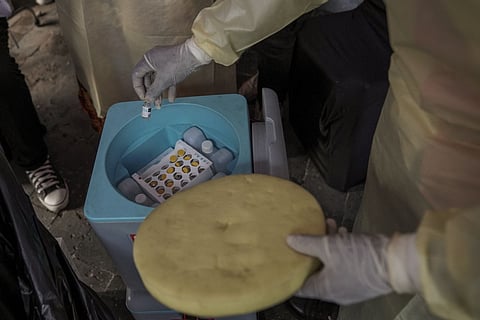WHO decides mpox epidemic still global health emergency
It still merits highest level of alert, with cases rising, its geographic spread widening

GENEVA: Mpox remains an international public health emergency, the World Health Organisation said Thursday after deciding the epidemic still merits the highest level of alert, with cases rising and its geographic spread widening.
“The mpox upsurge continues to meet the criteria of a public health emergency of international concern (PHEIC),” said a WHO statement.
The emergency committee on mpox met for the third time on Tuesday and advised WHO chief Tedros Adhanom Ghebreyesus that the situation still constituted a PHEIC.
The decision was “based on the continuing rise in numbers and geographic spread, the violence in the eastern Democratic Republic of the Congo - which hampers the response - as well as a lack of funding to implement the response plan”, said the brief statement.
Symptoms of mpox:
Early symptoms (within 1-5 days):
Fever
Headache
Muscle aches
Back pain
Swollen lymph nodes
Chills
Exhaustion
Later symptoms (rash development):
A rash that starts as flat lesions, then turns into fluid-filled blisters
Lesions may appear on the face, hands, feet, inside the mouth, and even genital areas
The rash eventually scabs over and falls off
Other key information:
Incubation period: 5-21 days
Transmission: Direct contact with infected person’s skin lesions, bodily fluids, contaminated objects, or respiratory droplets
Duration: Usually 2-4 weeks
Prevention: Vaccination, avoiding contact with infected individuals, and maintaining hygiene
Treatment: Supportive care, antivirals (in severe cases)
The UN health agency’s chief had declared the emergency amid a rapid spread of the disease, formerly known as monkeypox, in Africa and especially in the DR Congo.
15 countries so far
Mpox is caused by a virus from the same family as smallpox. It can be transmitted to humans by infected animals but can also be passed between people through close physical contact.
The disease, which was first detected in humans in 1970 in the DR Congo, then known as Zaire, causes fever, muscular aches and large boil-like skin lesions, and can be deadly.
It has two subtypes: clade 1 and clade 2.
The virus, long endemic in central Africa, gained international prominence in May 2022 when clade 2 spread around the world, mostly affecting gay and bisexual men.
Nearly 128,000 mpox cases have been laboratory confirmed across 130 countries since then, including 281 deaths, WHO data shows.
The WHO declared a global health emergency in July 2022, but thanks to vaccination and awareness drives that helped stem the spread, that declaration was lifted in May 2023.
Just a year later, however, a new two-pronged epidemic broke out mainly in the DR Congo, with both the original clade 1a strain and a new strain, clade 1b.
This prompted the WHO’s new emergency declaration last August.
To date, community spread of the clade 1b strain has been confirmed in the DRC and five other African nations, and it has been detected in another 15 countries around the world in connection with travel, WHO data shows.
The DRC confirmed more than 13,000 mpox cases and 43 deaths in 2024, and the country confirmed more than 2,000 cases in the first five weeks of this year - more than half of the cases confirmed globally.
Sign up for the Daily Briefing
Get the latest news and updates straight to your inbox


